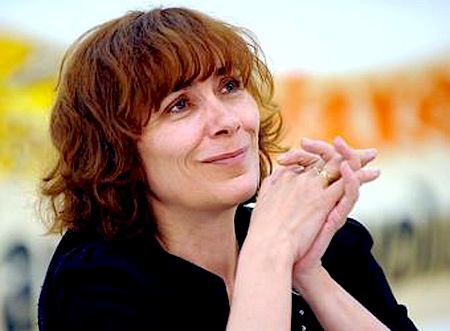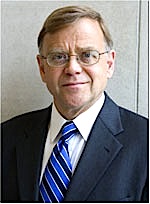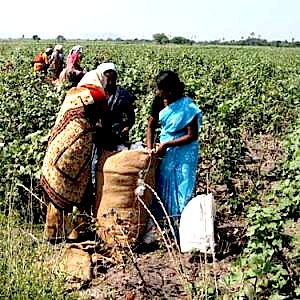RESISTANCE CINEMA Presents “THE WORLD ACCORDING TO MONSANTO” A film by Marie-Monique Robin, Image & Compagnie productions Thalie ARTE France, National Film Board of Canada, 2008, 109 min.
WHEN: Sunday January 24, 2010 1:15pm
WHERE: Community Church NYC, Gallery Room 28 East 35th st. @ Park ave.
ADMISSION: Free, donations appreciated
 Documentary filmmaker Marie-Monique Robin's film "Le Monde selon Monsanto" ("The World According to Monsanto") explores the history and future direction of chemical and so-called "life sciences" industrial company Monsanto. Based in St. Louis, Missouri, Monsanto was founded in 1901 to manufacture the synthetic sweetener saccharin. The multinational biotech company in the intervening decades has produced styrene and PCBs; became the leading producer of Agent Orange used in the Vietnam War; manufactures Roundup, the best-selling herbicide; and has advanced the development of genetically engineered seeds and bovine growth hormone.
Documentary filmmaker Marie-Monique Robin's film "Le Monde selon Monsanto" ("The World According to Monsanto") explores the history and future direction of chemical and so-called "life sciences" industrial company Monsanto. Based in St. Louis, Missouri, Monsanto was founded in 1901 to manufacture the synthetic sweetener saccharin. The multinational biotech company in the intervening decades has produced styrene and PCBs; became the leading producer of Agent Orange used in the Vietnam War; manufactures Roundup, the best-selling herbicide; and has advanced the development of genetically engineered seeds and bovine growth hormone.
Marie-Monique Robin's film, based on her book, is the result of three years of research and interviews from around the world, and explores the biotech giant's legal battles and controversies in the manufacture of toxic herbicides and the production of genetically modified organisms. Monsanto currently markets its brand as a "life sciences" company emphasizing its green image.
the world, and explores the biotech giant's legal battles and controversies in the manufacture of toxic herbicides and the production of genetically modified organisms. Monsanto currently markets its brand as a "life sciences" company emphasizing its green image.
Monsanto is the world leader in genetically modified organisms (GMOT) and likes to style itself as a “life sciences” company. The leader in genetically modified seeds, engineered to resist its herbicide Roundup, claims it wants to solve world hunger while protecting the environment.
 In the light of its troubling past, can we really believe these noble intentions? Misleading reports, collusion, pressure tactics and attempts at corruption: the history of Monsanto is filled with disturbing episodes. Behind its clean, green image, Monsanto is tightening its grasp on the world seed market, striving for market supremacy to the detriment of food security and the global environment.
In the light of its troubling past, can we really believe these noble intentions? Misleading reports, collusion, pressure tactics and attempts at corruption: the history of Monsanto is filled with disturbing episodes. Behind its clean, green image, Monsanto is tightening its grasp on the world seed market, striving for market supremacy to the detriment of food security and the global environment.
The story starts in the White House, where Monsanto often got its way by exerting disproportionate influence over policymakers via the “revolving door”. One example is Michael Taylor, who worked for Monsanto as an attorney before being appointed as deputy commissioner of the US Food and Drug Administration (FDA) in 1991. While at the FDA, the authority that deals with all US food approvals, Taylor made crucial decisions that led to the approval of GE foods and crops. Then he returned to Monsanto, becoming the company’s vice president for public policy.
commissioner of the US Food and Drug Administration (FDA) in 1991. While at the FDA, the authority that deals with all US food approvals, Taylor made crucial decisions that led to the approval of GE foods and crops. Then he returned to Monsanto, becoming the company’s vice president for public policy.
Thanks to these intimate links between Monsanto and government agencies, the US adopted GE foods and crops without proper testing, without consumer labeling and in spite of serious questions hanging over their safety.
Monsanto’s long arm stretched so far that, in the early nineties, the US Food and Drugs Agency even ignored warnings of their own scientists, who were cautioning that GE crops could cause negative health effects. Other tactics the company uses to stifle concerns about their products include misleading advertising, bribery and concealing scientific evidence.
 Over the last decade, Monsanto aggressively bought up over 50 seed companies around the globe. Seeds are the source of all food. Whoever owns the seeds, owns the food. The process of genetic engineering allows companies, such as Monsanto, to claim patent rights over seeds. Ninety percent of all GE seeds planted in the world are patented by Monsanto and hence controlled by them.
Over the last decade, Monsanto aggressively bought up over 50 seed companies around the globe. Seeds are the source of all food. Whoever owns the seeds, owns the food. The process of genetic engineering allows companies, such as Monsanto, to claim patent rights over seeds. Ninety percent of all GE seeds planted in the world are patented by Monsanto and hence controlled by them.
Patents on seeds give companies like Monsanto unprecedented power. Monsanto prohibits farmers saving patented GE seeds from one crop to replant the next season, an age-old practice. To ensure that farmers do not reuse seeds, Monsanto created its own 'gene police', and encourages farmers to turn in their neighbors.
 The film documents the devastating impact of Monsanto's malpractices around the world. Among others, it
The film documents the devastating impact of Monsanto's malpractices around the world. Among others, it includes the real-life stories of cotton farmers in India that ended up in hopeless debts after using Monsanto genetically engineered (so called Bt) cotton, and of a family in Paraguay, South America whose dreams have turned to nightmares after their farm became surrounded by fields planted with Monsanto’s GE soya.
includes the real-life stories of cotton farmers in India that ended up in hopeless debts after using Monsanto genetically engineered (so called Bt) cotton, and of a family in Paraguay, South America whose dreams have turned to nightmares after their farm became surrounded by fields planted with Monsanto’s GE soya.
“Mrs. Robin should be congratulated for revealing the sinister practices of the world’s leading producer of genetically engineered seeds. Her film is alarming and should be a call to action for everybody who cares about the quality of our food and a healthy future for our planet.” - Geert Ritsema - Greenpeace International